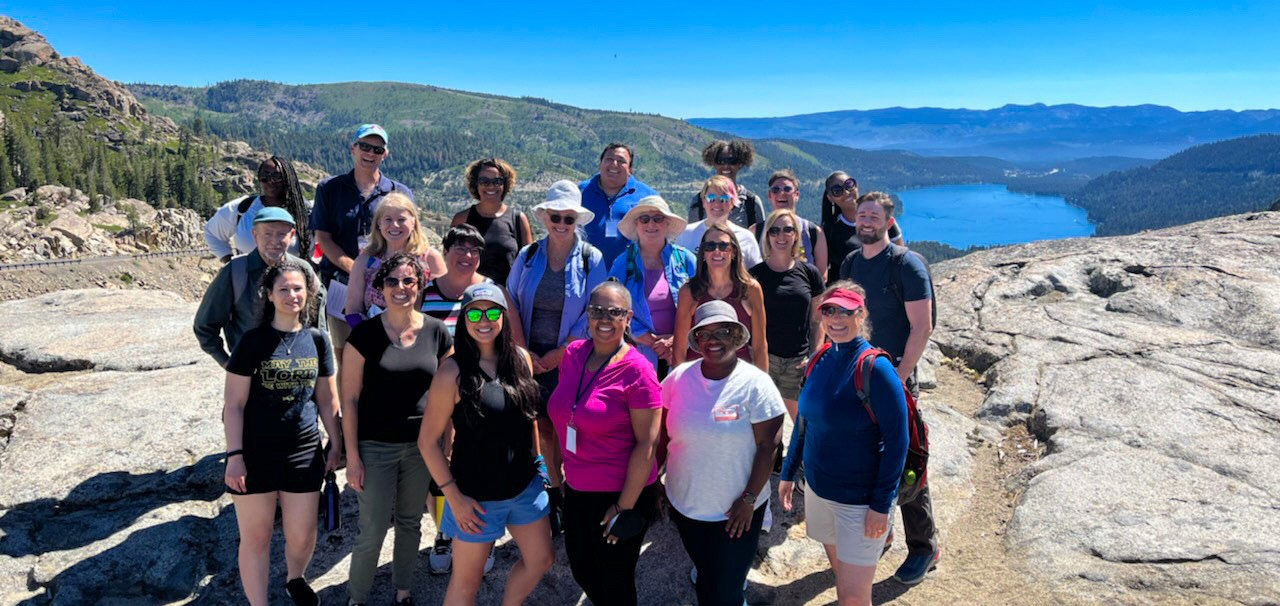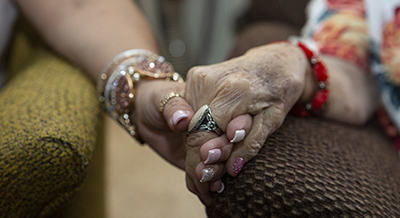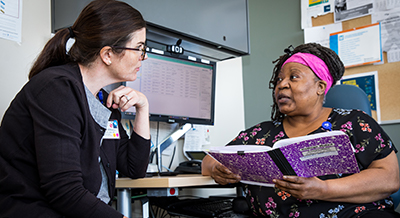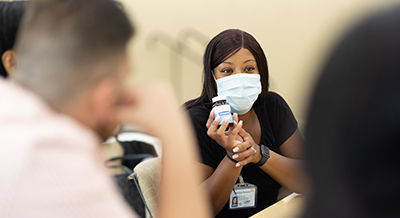When she launched the Betty Irene Moore Fellowship for Nurse Leaders and Innovators in 2020, Heather M. Young had a vision — an annual gathering of fellows, mentors, nursing leaders and program faculty. After two years of pandemic restrictions, that vision became a reality in July.
Nurse scientists from all regions of the country gathered in Sacramento to connect with their cohorts, gaining new knowledge from faculty and advancing their contributions to nursing science research.
“Convocation is the cornerstone event of the fellowship,” says Young, the national program director for the fellowship. “It allows the fellows to explore contemporary issues in health care and population health with our Fellowship National Advisory Council and participate in structured learning activities focused on leadership, innovation and networking.”
The Gordon and Betty Moore Foundation established the fellowship program through a $37.5 million grant. The first class of 11 entered in summer 2020, when the country was in the throes of the COVID-19 pandemic and a national reckoning of the social justice movement. Since then, two more cohorts of early- to-mid-career nurse scientists embarked upon this fellowship journey.
“As a mid-career nurse scientist, I want resources and supports to elevate my work to the next level. In particular, I want to build skills to be an effective leader and be pushed to think differently to disrupt prevailing practices around the prevention of diabetes in minority populations,” explains Tam Nguyen, an associate professor at Boston College and member of 2022 cohort. “I loved what we learned at Convocation. It gave me the courage to dream big and expand my perspective of what is possible.”
Past exploration influences future innovation
Fellows from the first and second cohorts took a field trip to Donner Pass in Northern California to learn how the lessons of past explorers shed light on how these scientists innovate in their research. Led by Harold Schmitz, a senior scholar in the UC Davis Graduate School of Management and Gordon Chang, Stanford University professor and author of The Ghosts of Gold Mountain: The Epic Story of the Chinese Who Built the Transcontinental Railroad, the excursion focused on how early settlers led through challenges and shaped future innovation.
Using the physical experience atop the granitic Sierra Nevada Batholith, now known as Donner Pass, fellows explored the real and symbolic challenges in their own spheres, learning that leadership success depends upon pressing on through the darkness of bias and creating a more equitable reality.
“After developing an understanding of the physical, geographical and racial challenges that 19th century explorers of the West faced, we challenged the fellows to identify the characteristics they need to develop when leading others in a journey of high risk and high reward,” Young says.
Young reminded the nurse scientists of Gordon Moore, co-founder of the Intel Corporation, who helped shape what we now know as Silicon Valley. He seized the opportunity to parlay his leadership in the semi-conductor arena into health care to leave an indelible mark on nursing leadership.
Building skills, advancing health care
When a COVID-19 exposure forced program leaders to pivot to Zoom after the excursion, the connection with each other and celebration of nursing never stopped.
“Health and safety required we transition to a virtual format. I’m so grateful for everyone’s flexibility and the amazing days together in Donner Pass with the first two cohorts meeting in person for the first time, deepening their connections with one another,” Young says.
Fellows also worked on building foundational knowledge to advance their work. From strategic communications and human-centered design problem solving to proposal and budget development, fellows participated in structured learning activities focused on leadership, innovation and networking led by the national program office, the UC Davis Graduate School of Management and expert program faculty. They even pitched their projects for media coverage to a panel of experienced journalists for feedback and suggestions on ways to strengthen how they communicate their work.
“As an individual, I have self-reflected more than I ever have about my identity and its various aspects and how many of those traits afford privilege in a way that influences for better and worse individuals around me. My growth has stemmed from trying to better master awareness of and leveraging this privilege for good,” says Nick Dionne-Odom, an associate professor in the School of Nursing at the University of Alabama at Birmingham. “I’m looking forward to further solidifying lifelong relationships with my cohort and to completing a project that I think could have high impact for family caregiver support in the oncology space.”
A highlight of the entire event was the keynote presentation by Mary Wakefield, Fellowship National Advisory Council member, former acting deputy secretary of the U.S. Department of Health and Human Services and visiting professor at the University of Texas at Austin School of Nursing. In her presentation, “Nursing Influence: Power, Politics and Policy,” she highlighted how nurses can get involved.
“Nurse scientists have immense potential to effect change at the state and national levels. Consequently, learning how to craft initiatives and build relationships with policymakers is vital to informing health policies to advance the nation’s health,” Wakefield says.
Inaugural Betty Irene Moore Fellows complete their research projects this year, which is their final year in the program. They also mentor those nurse scientists who come behind them in this transformative process. Ultimately, their collective growth in leadership and innovation has the power to improve health care delivery and advance health nationwide.
Nurse leader fellows publish landmark paper
The four Black nurse scientists in the inaugural cohort of the Betty Irene Moore Fellowship for Nurse Leaders and Innovators realized early on in the program they were all graduates of historically Black colleges and universities (HBCUs). Since each invests in research addressing health inequities in Black communities, they knew they were destined to impact the future of nursing.
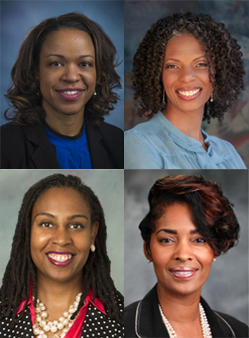 The collaboration between Dawn M. Aycock, Kamila A. Alexander, Fawn A. Cothran and Schenita Davis Randolph culminated in “Black nurse scientists and the undeniable role of historically black colleges and universities.” Published online in Nursing Outlook, the official journal of the American Academy of Nursing and the Council for the Advancement of Nursing Science, the article discusses the importance of HBCUs and how nurses who graduate from these establishments are well-positioned to address the health inequities in Black communities.
The collaboration between Dawn M. Aycock, Kamila A. Alexander, Fawn A. Cothran and Schenita Davis Randolph culminated in “Black nurse scientists and the undeniable role of historically black colleges and universities.” Published online in Nursing Outlook, the official journal of the American Academy of Nursing and the Council for the Advancement of Nursing Science, the article discusses the importance of HBCUs and how nurses who graduate from these establishments are well-positioned to address the health inequities in Black communities.
“I am excited to be able to highlight the HBCU nursing programs that inspired our nursing science careers. I hope others can have similar experiences and even greater opportunities to be able to address health challenges through research,” Aycock says. “I have so much hope that we can build structures to uncover the often-invisible talent contributing to the development of transformative knowledge within our discipline. Perhaps by implementing some of the strategies we suggest in this paper, we can spark innovative and creative partnerships that will foster growth and secure a stronger future for nursing science,” Alexander adds.


